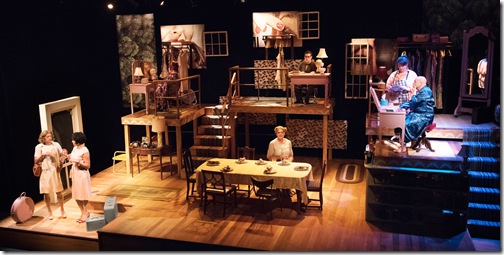Casa Valentina: Transvestites in the Catskills circa 1960
Photo: Glenn Perry
Casa Valentina, now playing at Boston’s SpeakEasy Stage, is based on a little known world of the mid-20th century in which supposedly heterosexual men partied together cross-dressed in order to release their “inner woman.” It is written by Harvey Fierstein, who is most celebrated for his semi-autobiographical play, Torch Song Trilogy, about a drag queen, a role he created on Broadway. In Casa Valentina, Fierstein, in tune with the times, attempts to explore the spectrum of sexuality.
Casa Valentina is modelled after Casa Susanna, a bona fide post-World War II guest house in the Catskills, where men who led heterosexual lives – some were married and fathers – escaped to live as their idea of women for a brief time. In the play, this mainly involves stereotypical behavior: ladies consumed by clothing, makeup, body shape, and “feminine” gesticulating. Yet despite this overriding similarity, each actor creates a distinct personality.
The house is owned and operated by George (Thomas Derrah), known as Valentina when in female guise and his long-term wife Rita (beautifully acted by Kerry A. Dowling) who does the scut work dressed in jeans and a shirt, while her husband entertains the visitors. Rita accepts her husband’s transvestitism, loves him, and feels loved in return. They both talk about their mutual sex life with pride.
Jonathon (Greg Maraio) a shy, young, newcomer livens up the action by allowing the various characters to give him/her an enthusiastic makeover, after which he/she is freed up to be Miranda in a spiffy new outfit. Until now, the character has cross-dressed in secret, keeping his drab female wardrobe locked in a suitcase for fear his wife would find it. Jonathon has been confused by his dual identity. How could a newly married man be unable to resist trying on his wife’s bridal gown when she was out of the room? The dangers of a dual gender identity haunt most, but not all of the characters who use the Casa Valentina as a safe house. Although Gloria (Eddie Shields), as brash as Jonathon is timid, brags about his/her female conquests, the sight of the girls’ clothing lying on the floor was more exciting than their naked bodies. The majority fear being viewed as gay or “homosexual” as would have been said in the early 1960s. Strangely, homophobia is rampant in this group.
This characteristic is strongest in Charlotte (Will McGarrahan), the publisher of a magazine dedicated to promoting the lifestyle of heterosexual men who find deep satisfaction in exposing their feminine side or anima as Jung called it. Unlike the other characters, Charlotte lives completely as her inner woman, always dressed to the nines, right down to her gloves. Contrary to the Judge/Amy (Timothy Crowe) who reverts to a tough and gruff male personality when threatened, Charlotte maintains her “femininity” even when angered, in a manner reminiscent of Carly Fiorina. Charlotte, who has served time for promoting what was mistakenly considered homosexuality, wants the guests to openly support her vision and sign oaths stating that they reject homosexual members. Some refuse, either out of fear of exposure or because they had been helped by gay friends. The plot thickens, secrets are revealed, and conflicts destroy the joyful and peaceful group.
While the material is thought-provoking and often funny, there is a dated feel to the structure of Fierstein’s writing. Scott Edmiston has developed a production with a strong ensemble. Janie E. Howland created a multi-levelled hotel on SpeakEasy’s small stage that gives the illusion of both privacy and space.
Produced by SpeakEasy Stage Company
Written by Harvey Fierstein
Directed by Scott Edmiston
Scenic Design by Janie E. Howland
Costume Design by Gail Astrid Buckley
Lighting Design by Karen Perlow
Cast: Timothy Crowe, Thomas Derrah, Kerry A Dowling, Greg Maraio, Deb Martin, Will McGarrahan, Sean McGuirk, Robert Saoud, Eddie Shields
Runs through November 28, 2015.
